Top Camera Drones for Beginners in 2025 | Easy Aerial Shots
- James Baptiste

- May 4, 2025
- 15 min read
Taking Off: Your First Drone Adventure
Choosing your first camera drone can be daunting. This list simplifies the process, presenting seven excellent camera drones for beginners in 2025. Whether you seek a portable travel companion or a drone with advanced features, you'll find the perfect fit for your budget and needs. We've considered portability, flight time, camera quality, and ease of use to help you confidently capture stunning aerial footage. Discover top models including the DJI Mini 3, Holy Stone HS720E, Ryze Tello, DJI Mavic Mini 2, Potensic Atom SE, Hubsan Zino Mini Pro, and Autel Robotics EVO Nano.
1. DJI Mini 3
The DJI Mini 3 is an ideal choice for beginners looking to enter the world of camera drones. Its sub-249-gram weight makes it exempt from drone registration requirements in many countries, simplifying the process of getting airborne. This lightweight design, coupled with its compact size, makes it incredibly portable, easily slipping into a backpack or even a large pocket. Perfect for travel bloggers, hikers, or anyone wanting to capture aerial perspectives on the go, the Mini 3 offers impressive performance without the regulatory hurdles. For beginners intimidated by complex drone regulations, this is a game-changer. It allows you to focus on learning the basics of flight and capturing stunning footage, rather than getting bogged down in paperwork. Priced at approximately $469 for the base package, it offers excellent value for its features.
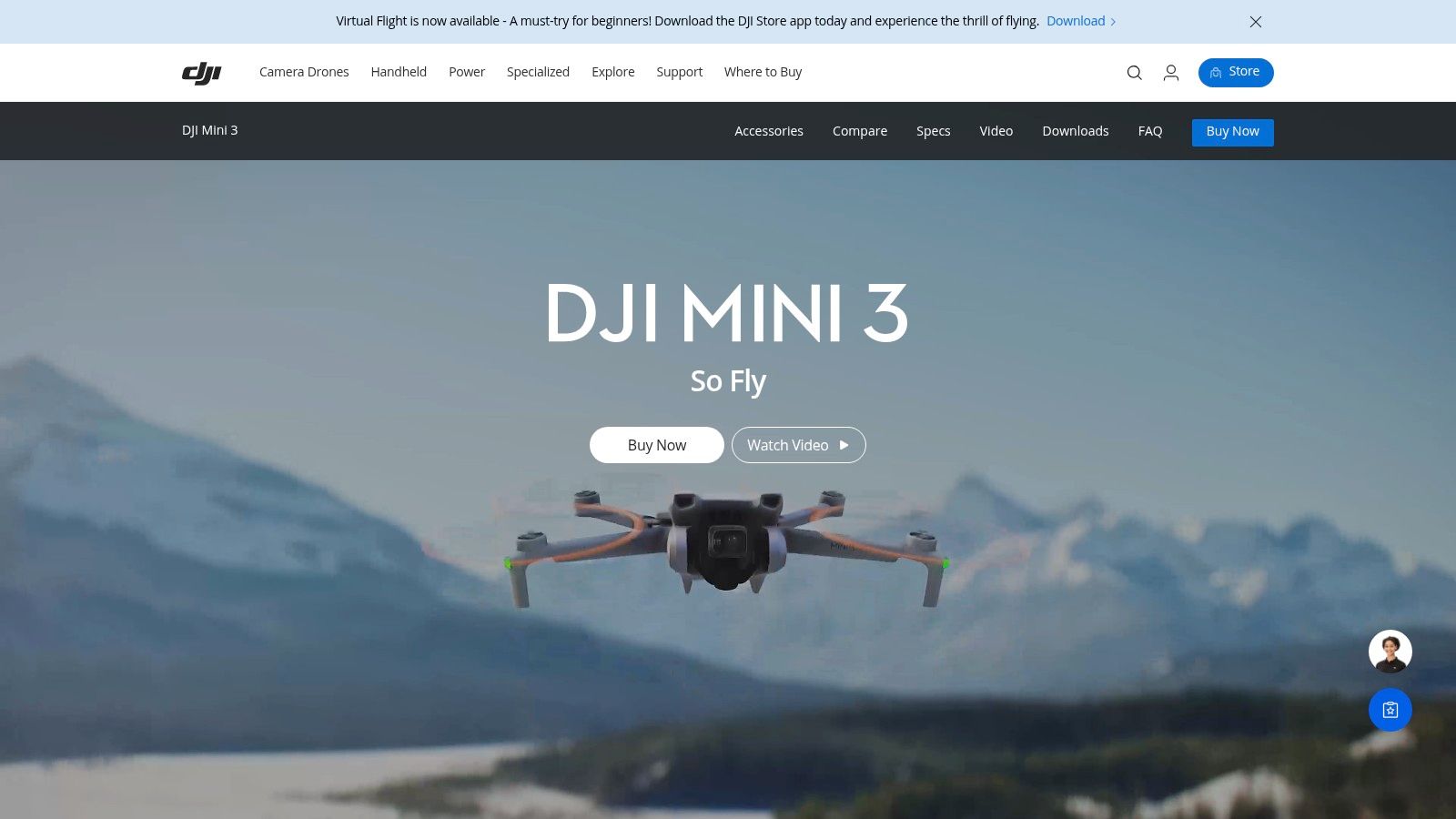
Equipped with a 1/1.3-inch CMOS sensor, the Mini 3 captures impressive 12MP photos and 4K/30fps video. This image quality surpasses many other drones in its weight class, making it a great option for capturing high-quality aerial footage for personal use or even semi-professional applications like real estate photography or showcasing vacation destinations. The 38-minute maximum flight time provides ample opportunity to capture the perfect shot, and the True Vertical Shooting mode makes creating content for social media platforms like Instagram and TikTok incredibly easy. Intelligent features such as QuickShots, pre-programmed flight maneuvers that produce professional-looking cinematic shots, and Return-to-Home functionality, which automatically brings the drone back to its takeoff point if the signal is lost or the battery is low, further enhance the user-friendly experience for beginners. You can Learn more about DJI Mini 3 and its capabilities.
While the DJI Mini 3 is an excellent camera drone for beginners, it's important to be aware of its limitations. Compared to higher-end models, the Mini 3 has limited obstacle avoidance. This means pilots need to be extra vigilant when flying in complex environments. The base model also lacks ActiveTrack, DJI's intelligent subject tracking feature, which automatically follows a selected subject. Finally, the controller requires a smartphone to operate, which can be a slight inconvenience for some users. However, the user-friendly controls and intuitive interface make it easy for beginners to pick up and start flying, even with the smartphone requirement. The DJI Mini 3’s blend of portability, performance, and ease of use makes it a standout choice among camera drones for beginners.
2. Holy Stone HS720E
The Holy Stone HS720E is a fantastic option for beginners looking to dive into the world of camera drones without breaking the bank. This budget-friendly quadcopter boasts a 4K camera equipped with Electronic Image Stabilization (EIS), ensuring smoother footage even with less-than-perfect piloting. Its impressive 23-minute flight time per battery lets you capture ample aerial footage before needing to swap in a fresh one, and the generous 1-kilometer transmission range provides a wide operational area for exploration. Priced at approximately $299, the HS720E offers remarkable value, especially considering the comprehensive starter package which includes a carrying case, spare batteries, and an intuitive app for easy control. This makes it an ideal choice for those wanting to experiment with aerial photography and videography without a significant initial investment.
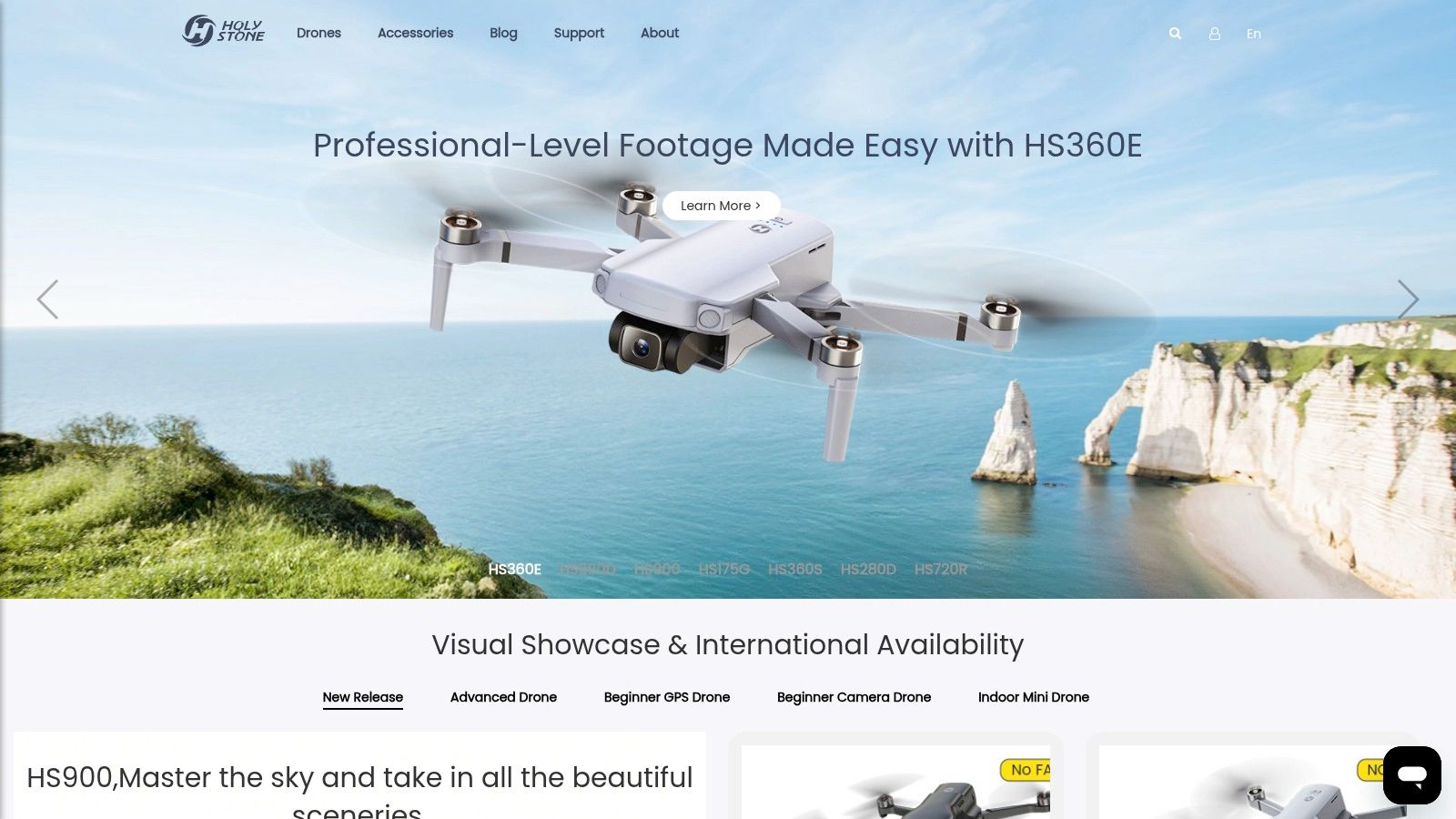
The HS720E is particularly well-suited for beginners due to its user-friendly features. GPS-assisted flight provides stable hovering and precise positioning, making it easier to learn the ropes. The "return to home" function offers added security, automatically bringing the drone back to its launch point with the press of a button. Beginner-friendly flight modes simplify operation, allowing novice pilots to focus on capturing stunning visuals rather than struggling with complex controls. Whether you're a budding aerial photographer, a tech enthusiast eager to explore drone technology, or simply someone looking for a fun new hobby, the HS720E is an excellent entry point. While the camera quality doesn't rival premium brands, it's more than adequate for capturing impressive footage for social media, personal projects, or simply enjoying the unique perspective of aerial views. The foldable design makes it highly portable, perfect for taking on adventures, and the included carrying case keeps everything organized and protected during transport.
Setting up the HS720E is straightforward, involving charging the batteries, installing the app on your smartphone, and following the on-screen instructions to connect the drone. While the app can occasionally be unstable, it generally provides a user-friendly interface for controlling the drone and adjusting camera settings. One important consideration for beginners is wind resistance: the HS720E is less stable in windy conditions compared to more expensive, heavier models. It's best to fly in calm weather to avoid potential issues. Learn more about Holy Stone HS720E Overall, the Holy Stone HS720E earns its place on this list as one of the best camera drones for beginners due to its excellent price-to-performance ratio, comprehensive package, ease of use, and impressive features for its price point. It provides an accessible and enjoyable way to experience the exciting world of aerial photography and videography.
3. Ryze Tello (powered by DJI)
The Ryze Tello is a fantastic entry point for aspiring drone pilots and a top pick among camera drones for beginners. Developed in partnership with DJI, this ultra-affordable drone (priced at just $99) combines ease of use with impressive functionality. It's ideal for those looking to dip their toes into the world of aerial photography and videography without breaking the bank. Whether you're a complete novice or looking for an educational tool, the Tello offers a compelling blend of performance and affordability.
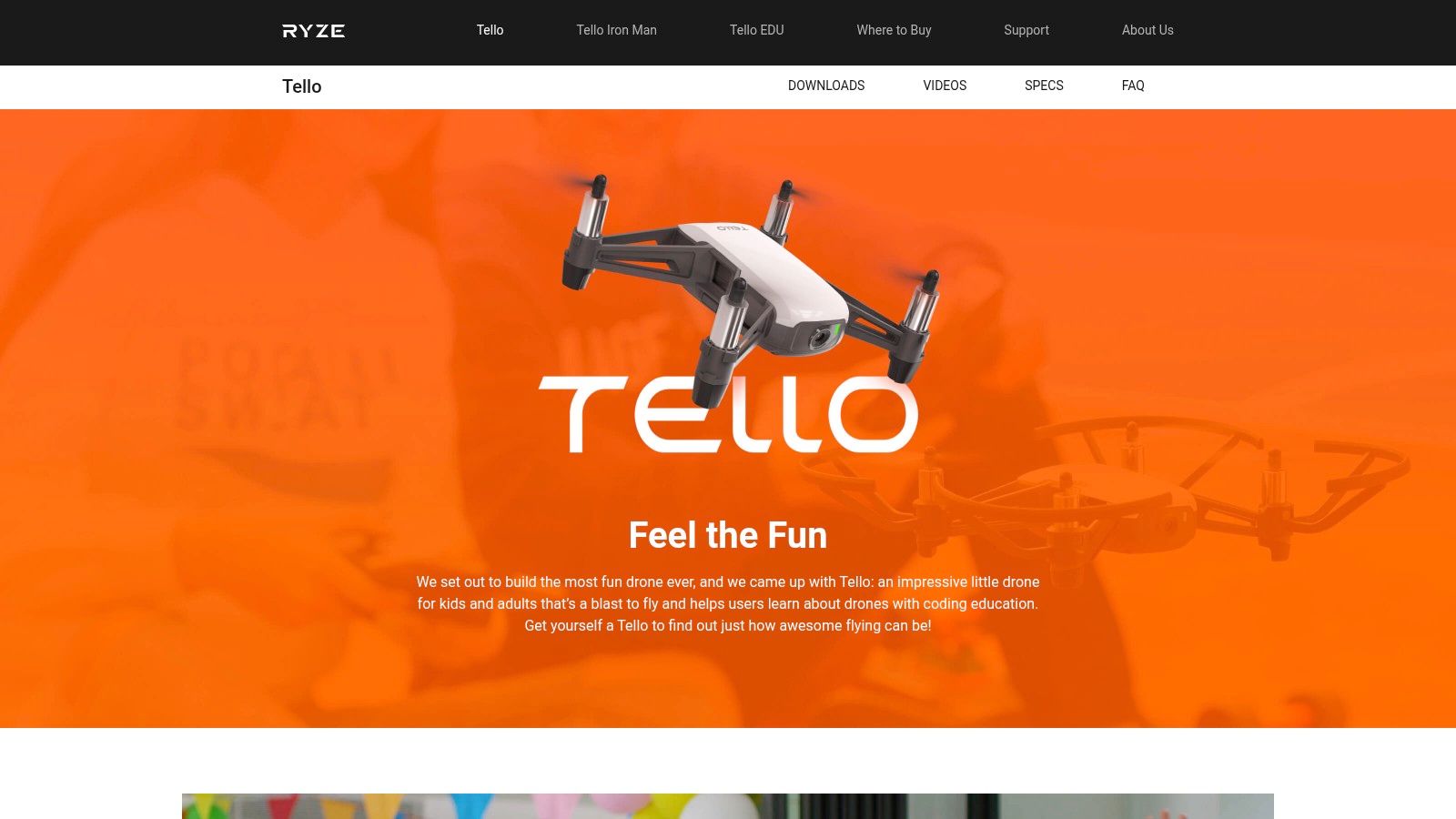
Despite its small size and price tag, the Tello boasts a 720p camera capable of capturing decent aerial footage and photos. Its intuitive smartphone control scheme makes it remarkably easy to fly, even indoors. Pre-programmed flight modes like "Throw & Go" and "8D Flips" add an element of fun and simplify complex maneuvers. The 13-minute flight time is respectable for a drone in this price range, providing ample opportunity to practice fundamental flight skills. For tech enthusiasts and educators, the Tello's compatibility with Scratch opens up a world of programming possibilities. Students can learn basic coding concepts while simultaneously exploring the principles of drone flight. This makes it a valuable tool for STEM education and a stepping stone to more advanced drones later on.
Compared to more sophisticated camera drones, the Tello focuses on simplicity and learning. While drones like the DJI Mini series offer superior camera quality and range, the Tello excels in its approachable design and affordability. This makes it the perfect training platform before investing in a pricier model. The Tello's lightweight design (just 80 grams) contributes to its ease of maneuverability, particularly indoors. However, this also makes it susceptible to wind gusts, so outdoor flights are best suited for calm conditions.
Features:
720p HD video transmission
Multiple pre-programmed flight modes (Throw & Go, 8D Flips, etc.)
13-minute flight time
Extremely lightweight at 80 grams
Programmable with Scratch and SDK support
Pros:
Most affordable quality camera drone on the market
Very easy to fly, even indoors
Great for learning drone basics
Durable design can withstand minor crashes
Cons:
Limited range (approximately 100m)
Camera quality is basic compared to dedicated camera drones
Susceptible to wind due to light weight
Setup Tips:
Download the Tello app on your smartphone (iOS and Android compatible).
Ensure your smartphone's Wi-Fi is enabled.
Connect your smartphone to the Tello's Wi-Fi network.
Follow the in-app instructions for calibration and first flight.
The Ryze Tello earns its spot on this list as the best budget-friendly option for camera drones for beginners. It's a fantastic starting point for anyone curious about drones, offering a risk-free way to learn the ropes before committing to a more substantial investment. Its combination of affordability, ease of use, and educational value make it a standout choice for novice pilots.
4. DJI Mavic Mini 2
The DJI Mavic Mini 2 continues to be a strong contender in the camera drones for beginners category, even with newer models on the market. Its enduring popularity stems from a compelling combination of affordability (often found around $449), user-friendliness, and impressive capabilities. This makes it a fantastic entry point for aspiring aerial photographers and videographers. It’s ideal for capturing stunning travel footage, exploring your local area from a new perspective, or simply having fun experimenting with drone photography. Imagine effortlessly capturing sweeping panoramic shots of a sunset over a mountain range, or smoothly following a hiking trail through a dense forest – the Mavic Mini 2 makes these cinematic shots achievable for beginners.
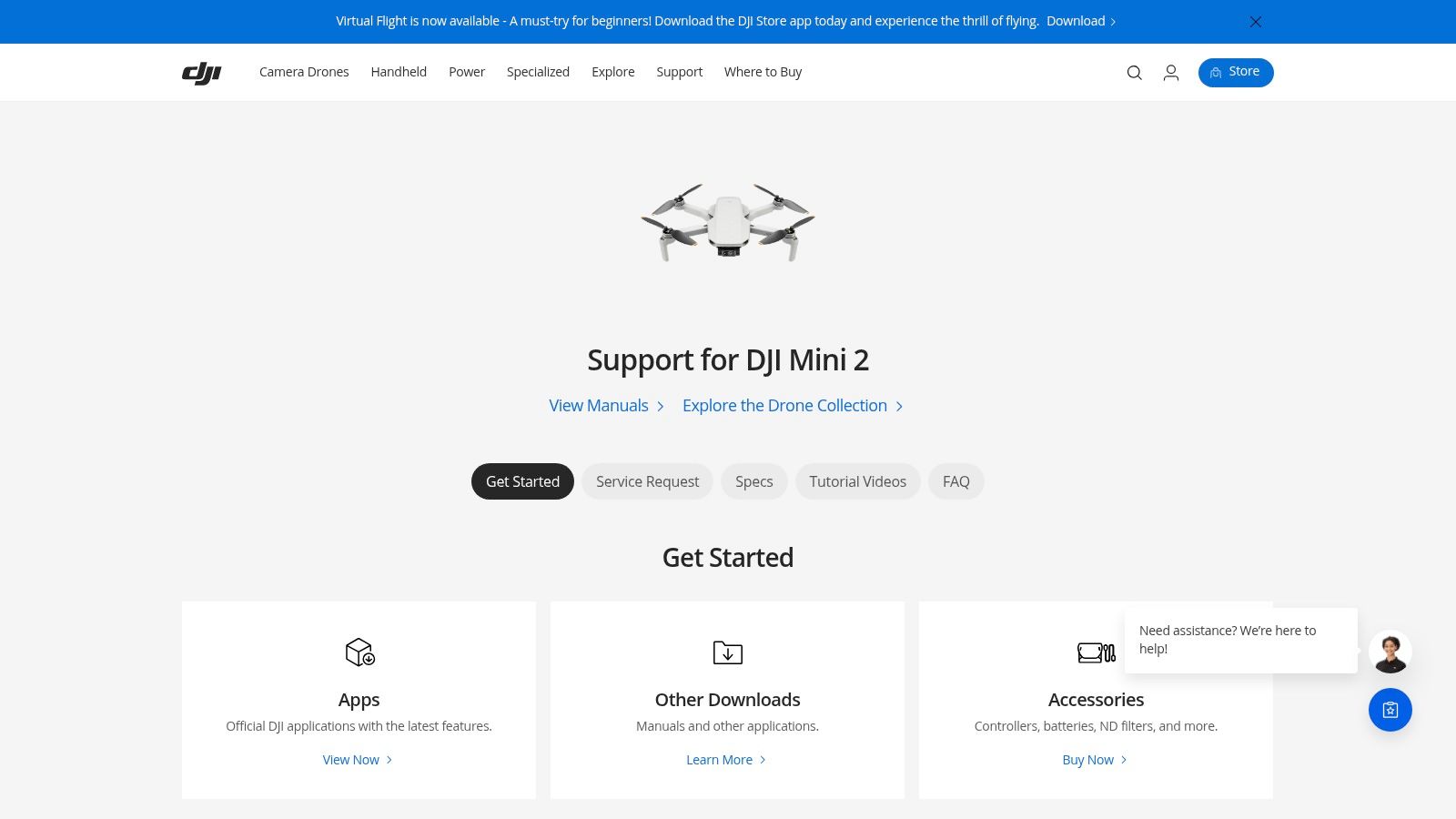
This ultra-lightweight drone, weighing in at just 249g, often avoids the need for registration in many regions, simplifying the process of getting airborne. The 4K/30fps video recording capability combined with the 3-axis mechanical gimbal delivers remarkably stable and high-quality footage, even in light winds. This stability is crucial for beginners who are still learning to control drone movements smoothly. A robust 31-minute flight time provides ample opportunity to capture the perfect shot, outperforming many other beginner camera drones in its price range. The intuitive DJI Fly app further enhances the user experience, guiding new pilots through the setup and flight process with ease. Features like QuickShot modes offer pre-programmed flight paths for capturing professional-looking shots with minimal effort. The 10km HD video transmission range provides a clear and reliable connection, allowing you to explore further with confidence. Learn more about DJI Mavic Mini 2 to see a broader range of information.
While the Mavic Mini 2 shines in many areas, it's important to be aware of its limitations. Unlike more advanced models, it lacks obstacle avoidance sensors, requiring pilots to be extra vigilant during flight. It also has a more limited set of advanced features compared to newer DJI drones. Finally, the controller, while functional, is bulkier than the controllers included with newer DJI models.
Pros:
Excellent image quality for the price
Very portable with foldable design
Long flight time compared to other beginner drones
DJI's reliable technology and build quality
Cons:
No obstacle avoidance sensors
Limited advanced features compared to newer models
Controller is bulkier than newer DJI models
For beginners looking for a high-quality, easy-to-fly camera drone with an attractive price point, the DJI Mavic Mini 2 remains an excellent choice. It provides a solid foundation in aerial photography and videography without breaking the bank. You can find more information and purchase the Mavic Mini 2 on the official website: https://www.dji.com/mini-2
5. Potensic Atom SE
The Potensic Atom SE is an excellent camera drone for beginners looking to capture stunning 4K footage without breaking the bank. Priced at approximately $199, this drone offers a compelling combination of features, flight time, and ease of use, making it a strong contender for anyone starting their aerial photography journey. Whether you're interested in capturing sweeping landscape shots or documenting your outdoor adventures, the Atom SE provides a user-friendly platform to explore the world of drone piloting.
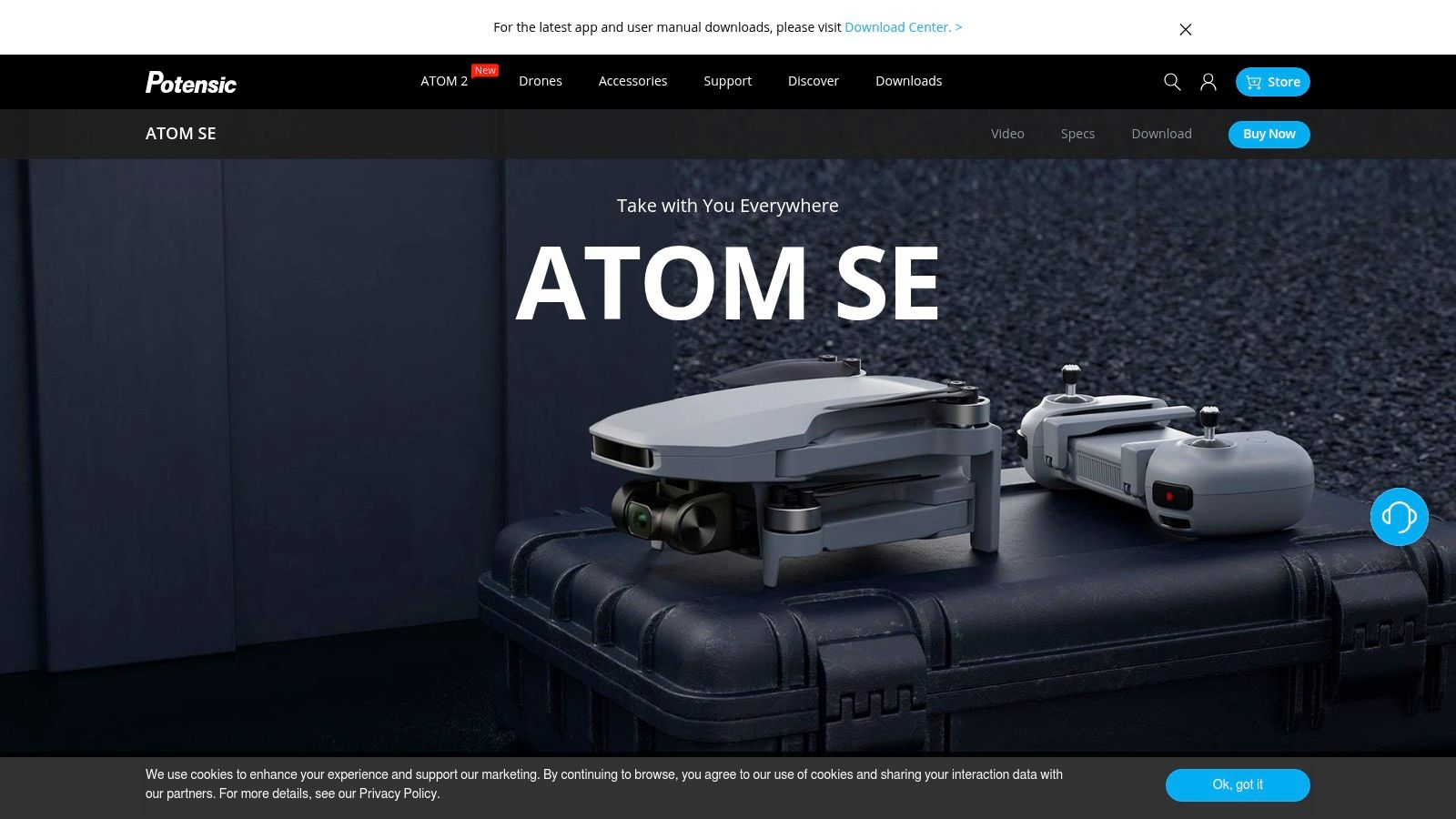
Equipped with a 1/3-inch CMOS sensor, the Atom SE captures 4K video at 30fps and 12MP still photos. While the electronic image stabilization helps smooth out footage, it's worth noting that it isn't as effective as the mechanical gimbals found on higher-end drones. However, for beginners, the EIS provides a decent level of stability, especially in light to moderate winds. One of the standout features of the Atom SE is its impressive flight time. With three included batteries, you get a total flight time of up to 62 minutes. This extended flight time allows for ample practice and exploration without the constant need to recharge.
The inclusion of GPS positioning is crucial for beginner pilots. This feature ensures accurate hovering and stable flight, making it easier to control the drone and frame your shots. Intelligent flight modes such as one-key return and follow-me further simplify the flying experience, providing an added layer of safety and convenience. The Potensic Atom SE’s foldable design and lightweight construction (245g) make it incredibly portable, perfect for taking on hikes, road trips, or any outdoor adventure. This weight also conveniently places it just below the FAA registration requirement in the United States (250g and above), simplifying the process for new pilots. The user-friendly mobile app provides intuitive controls and access to various camera settings and flight modes.
Compared to DJI's entry-level drones like the Mini SE, the Atom SE offers a more affordable option with longer flight time. While the camera quality on DJI drones is generally superior, the Atom SE provides excellent value for its price, especially considering the inclusion of three batteries. Setting up the Atom SE is straightforward; simply download the Potensic app, follow the pairing instructions, and you'll be ready to fly in minutes.
Features:
4K camera with electronic image stabilization
62 minutes total flight time (three batteries included)
GPS positioning with accurate hovering
Foldable design weighing 245g
Follow-me mode and waypoint navigation
Pros:
Excellent value with three batteries included
User-friendly app with intuitive controls
Lightweight design just under registration requirements
Good stability in light to moderate winds
Cons:
Electronic stabilization not as effective as mechanical gimbals
Limited transmission range (800m)
Camera quality doesn't match DJI equivalents
This drone deserves a place on this list because it strikes a great balance between price, performance, and features specifically tailored for beginners. The extended flight time, user-friendly controls, and intelligent flight modes make the Potensic Atom SE an ideal choice for anyone looking to enter the world of camera drones.
6. Hubsan Zino Mini Pro
The Hubsan Zino Mini Pro stands out as an excellent camera drone for beginners looking to step up their aerial photography and videography game without breaking the bank. At around $459, it offers a compelling blend of premium features typically found in higher-priced models, making it a fantastic value proposition for those seeking advanced capabilities from the get-go. This drone is perfect for aspiring aerial photographers, tech enthusiasts, and even budding commercial drone operators who want to explore more sophisticated flight and filming techniques.
One of the key features that makes the Zino Mini Pro so beginner-friendly is its comprehensive 3-way obstacle avoidance system. This safety net is invaluable for new pilots, helping prevent crashes and building confidence during those initial flights. You can focus on framing your shots and mastering the controls without constantly worrying about colliding with obstacles. This feature is relatively rare in this price range, giving the Zino Mini Pro a significant advantage over other camera drones for beginners.
Image quality is paramount for any camera drone, and the Zino Mini Pro delivers with a 1/1.3-inch CMOS sensor capable of capturing stunning 4K video at 30fps. Paired with a 3-axis mechanical gimbal, you can expect smooth, stable footage, even in moderately windy conditions. This makes it ideal for capturing professional-looking landscapes, cinematic travel videos, or dynamic action shots.
The impressive 40-minute flight time offers ample opportunity to explore your creativity and capture extensive footage without frequent battery swaps. This extended flight time significantly outperforms many competitors in the beginner drone category, allowing for longer shooting sessions and more comprehensive coverage of your subject.
Beyond the basics, the Zino Mini Pro offers a suite of advanced features that allow for skill development as you gain experience. These features include intelligent tracking modes powered by the AHDAS 3.0 system with subject recognition, waypoint navigation for pre-planned flight paths, and panorama shooting for capturing breathtaking wide-angle perspectives. These advanced features make the Zino Mini Pro an excellent long-term investment, providing room to grow as your skills develop and your aerial photography ambitions expand.
Pros:
Comprehensive obstacle avoidance for beginner safety
Excellent camera quality (4K/30fps) for the price range
Long 40-minute flight time compared to competitors
Advanced features like subject tracking and waypoint navigation allow for skill growth over time
Cons:
The app interface is reportedly less polished than DJI's, potentially requiring a slight learning curve.
Customer support may not be as robust as larger, more established brands.
Some users have reported occasional connectivity issues.
Technical Requirements: A compatible smartphone or tablet is required to run the Hubsan app and control the drone.
Setup Tips: Before your first flight, ensure you fully charge the drone's battery, calibrate the compass, and familiarize yourself with the app's controls and features. Practice in an open, unobstructed area to get a feel for the drone's handling.
Compared to DJI's Mini 2, the Zino Mini Pro offers superior obstacle avoidance and a larger sensor for improved image quality, but potentially at the expense of app refinement and customer support. For beginners prioritizing safety and camera performance, the Zino Mini Pro presents a strong argument.
For those seeking a camera drone for beginners that offers a balance of affordability, advanced features, and safety, the Hubsan Zino Mini Pro is an excellent option. It provides a solid foundation for developing aerial photography skills and capturing stunning footage from the outset. You can find more information on the Hubsan website: https://www.hubsan.com/na/goods-69.html
7. Autel Robotics EVO Nano
The Autel Robotics EVO Nano is a fantastic choice among camera drones for beginners willing to invest a bit more for premium features. While it sits at the higher end of the beginner drone price range at around $649, it offers exceptional value with a compelling blend of portability, performance, and safety features. This makes it an ideal option for aspiring aerial photographers and videographers who want professional-grade results without the steep learning curve. Learn more about Autel Robotics EVO Nano
One of the EVO Nano's key strengths is its compact, sub-249g design, making it exceptionally portable and often exempt from stricter drone regulations depending on your location. Don't let its small size fool you though; this drone packs a punch. It boasts a 1/2-inch CMOS sensor capable of capturing stunning 4K/30fps HDR video and crisp 48MP photos. This image quality rivals that of much larger, more expensive drones, allowing beginners to capture breathtaking aerial footage right out of the box.
For novice pilots, safety is paramount, and the EVO Nano delivers on this front with its three-way obstacle avoidance system. Front, rear, and downward-facing sensors help prevent collisions, giving beginners the confidence to explore their creative potential without constantly worrying about crashes. This is a significant advantage over some cheaper beginner drones that lack these crucial safety features.
Beyond its camera and safety features, the EVO Nano offers a respectable 28-minute flight time and an impressive 10km transmission range thanks to its REMO-Q technology. This extended range and flight time allow for more expansive exploration and capturing longer shots without needing frequent battery swaps. The intuitive app and controller design further enhance the user experience, making it easy for beginners to master the controls and access various flight modes.
Pros:
Premium build quality with good crash resistance.
Excellent camera performance in various lighting conditions.
Comprehensive safety features ideal for beginners.
No white card calibration required, unlike DJI drones, simplifying setup and operation.
Cons:
Higher price point compared to other beginner options.
Slightly heavier than some competitors in the sub-249g class, though still highly portable.
The app has fewer features than DJI's ecosystem, which might limit advanced users.
Key Features:
Three-way obstacle avoidance system (front, rear, downward)
1/2-inch CMOS sensor
4K/30fps HDR video recording
48MP photo capability
28-minute flight time
10km transmission range with REMO-Q technology
Implementation Tip: While the EVO Nano is beginner-friendly, take some time to familiarize yourself with the controls and app before your first flight. Practicing in a wide-open space will help you build confidence and avoid potential mishaps.
If you're a beginner looking for a premium camera drone that offers top-notch features and prioritizes safety without being overly complex, the Autel EVO Nano is an excellent investment. Visit the Autel Robotics website for more information and technical specifications.
Beginner Camera Drones Feature Comparison
Model | Key Features & Flight Time | User Experience & Quality ★★★★☆ | Value & Price 💰 | Target Audience 👥 | Unique Selling Points ✨ |
|---|---|---|---|---|---|
DJI Mini 3 | 4K/30fps, 38 min, <249g, True Vertical Shooting | Smooth controls, wind resistant | ★★★★☆ | $469 – Great for beginners | Portable, no registration needed, QuickShots |
Holy Stone HS720E | 4K EIS, 23 min, GPS, 1km range, foldable | Beginner-friendly, app control | ★★★★★ | $299 – Budget-conscious beginners | Extras included: spare batteries & carrying case |
Ryze Tello (DJI) | 720p, 13 min, ultra-light 80g, Scratch programmable | Very easy to fly indoor, durable | ★★★☆☆ | $99 – Absolute beginners & education | Programmable, best for STEM learning |
DJI Mavic Mini 2 | 4K/30fps, 31 min, 3-axis gimbal, 10km range, <249g | Reliable tech, stable footage | ★★★★☆ | $449 – Beginners wanting pro features | Long range, mechanical gimbal |
Potensic Atom SE | 4K EIS, 62 min (3 batteries), GPS, foldable | User-friendly app, stable | ★★★★☆ | $199 – Budget beginners | Long flight, multiple batteries |
Hubsan Zino Mini Pro | 4K/30fps, 40 min, 3-axis gimbal, obstacle avoidance | Good camera, safety features | ★★★★☆ | $459 – Beginners seeking advanced features | 3-way obstacle avoidance, tracking modes |
Autel EVO Nano | 4K/30fps HDR, 28 min, 48MP, 3-way obstacle avoidance | Premium build, safe, good low-light camera | ★★★☆☆ | $649 – Premium beginner/enthusiasts | No white card calibration, HDR video |
Soaring to New Heights: Choosing the Right Drone
From the nimble DJI Mini 3 to the budget-friendly Ryze Tello, and the feature-rich Autel Robotics EVO Nano, each camera drone for beginners on this list offers a unique blend of capabilities. We've covered models suitable for a variety of needs, whether you're interested in casual photography, exploring drone technology, or even stepping into professional applications. Remember, the best camera drone for beginners is the one that aligns with your specific goals and budget. Key takeaways include understanding the importance of flight time, camera resolution, ease of use, and safety features.
Choosing the right drone involves considering factors like your intended use case (photography, videography, racing, etc.), your budget, and the level of control you're comfortable with. Some drones offer automated flight modes ideal for beginners, while others provide more manual control for experienced users. If you're still unsure which drone is right for you, check out this helpful resource on the best drones with cameras to further explore your options. This article from Dronedesk provides comprehensive reviews and comparisons of various drone models, allowing you to delve deeper into their individual strengths and weaknesses.
As you embark on your drone journey, always prioritize safety. Familiarize yourself with local drone regulations and practice responsible flying habits. With the right camera drone for beginners and a commitment to safe operation, you'll be capturing breathtaking aerial perspectives in no time.
Ready to take your drone research to the next level? JAB Drone offers comprehensive reviews, comparisons, and expert guides specifically tailored for beginners looking to find their perfect camera drone. Visit JAB Drone and discover the ideal drone to launch your aerial adventures.




Comments